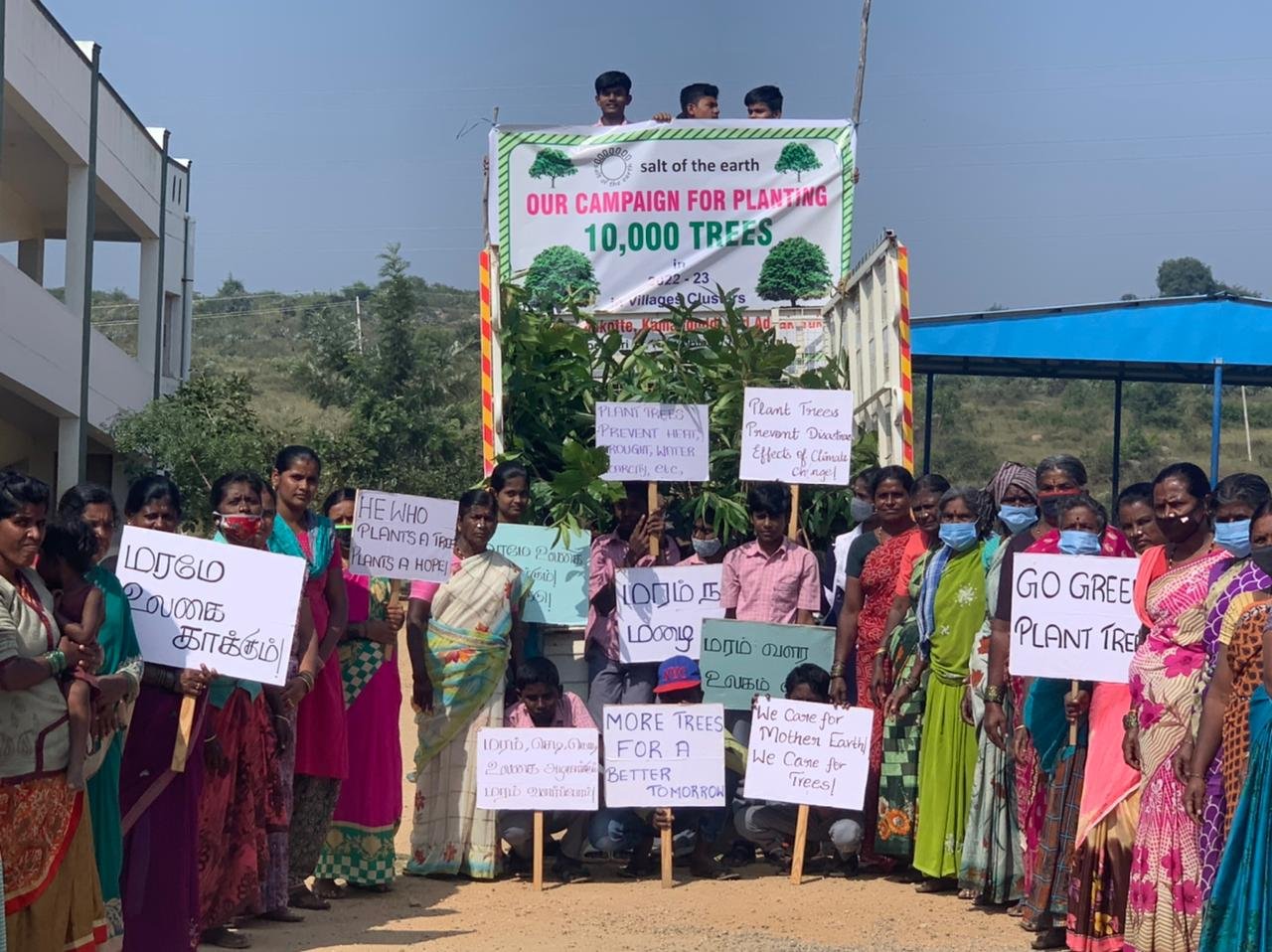Salt of the Earth fund a variety of tree planting and environmental projects in rural Indian villages
Tree planting campaign in action
The need:
South India is in direct threat of climate change. In 2019, the city of Chennai suffered it’s worst drought in 70 years. According to www.earth.org ,12 out of 15 of the world’s most polluted cities are located in India.
The global average according to www.iea.org is 4.7 tonnes of CO2 per person per year. The average person living in a rural village in Tamil Nadu produces less than 0.5 Tonnes of CO2 a year, yet are directly affected by climate change. The rural poor face dehydration, starvation, air pollution, and ultimately, early death.
Environmental awareness day participant receiving a sapling to take home
The benefits of planting trees in rural India
Since 1988, Salt of the Earth has planted more than 350,000 trees across South India.
Planting trees benefit both the rural poor of Tamil Nadu and the environment. Trees provide an abundance of benefits at a minimal cost. Young trees can absorb an average of 13 pounds (5.9kg) of CO2 during their first few years of growth. By the age of 10, trees have the capability to absorb 48 pounds of CO2 per year, see Carbon Pirates for more information.
Salt of the Earth charity plants trees on highways, in school compounds, and gives trees to rural families to plant outside their homes. Trees planted on highways are specially selected to withstand winds and provide shade. Trees provided to families offer food, medicines, shade, timber or antiseptics that can be consumed by families and also sold for income.
More benefits of planting trees for poor communities include:
Trees rapidly improve the local climate by providing shade, reducing the temperature, and promoting rainfall.
Trees improve soil quality through composting, water retention, and reduction of soil erosion.
Trees give rural families a source of sustainable income and nutricious food.
The act of organising and planting trees builds confidence and gives hope to communities.
Local families waiting under a SOTE for the bus
Our current environmental programmes include:
Providing fruit trees to rural families for income and food.
Planting trees on public highways and main roads.
Donating trees to schools to provide shade and fruits for children.
Planting trees in communal village areas to provide shade.
Training rural women to grow medicinal herbs and providing seeds.
Setting up kitchen gardens and training families in organic cultivation.
Environmental campaigns to spread awareness about protecting trees and reducing plastic waste.
Growing plants and saplings at CRUSADE’s organic compound, run by village workers from rural families.
Training families how to utilise wastewater from their homes.
We are passionate about funding environmental projects that give rural people food, shade, and hope.
Gardener, Kasthuri, who helps cares for over 5000 SOTE trees at Ashagram campus
Help us plant trees in rural India:
Organic grow bags by SOTE and CRUSADE for families with limited outdoor space.
School children planting trees with their teacher
Kitchen garden in action!
Mallamma and her grandchildren outside their kitchen garden
Mallamma (nicknamed Amma), is 56 and lives on the outskirts of Kamandoddi village in a small home with her son, and young granddaughter, and grandson. She does not do paid work outside the home, instead cares for the children and runs the household. She expresses that in the past, she was perceived as an unskilled grandma with no voice.
Mallamma’s neat and green kitchen garden is maintained daily with great pride. She spends several hours a day tending to vegetables in her garden. She grows four types of greens, coriander, tomatoes, beetroot, and radish, and a banana and a gooseberry tree. The garden has improved her wellbeing and given her a sense of achievement. Through her garden, she can feed her son’s family and no longer needs to buy expensive veg from vendors.
The food she grows is organic and she expresses: ‘I just pick fresh from the garden when needed and it can be eaten immediately!’
Mallamma involves her grandchildren who love helping her. In early Feb 2023, some plants were already on their second crop in 6 months!
Mallamma sends her thanks to SOTE for her garden, and also its protective fence and for the motivation and training she has received from MASARD.
Mallama’s granddaughter picking vegetables in their kitchen garden









